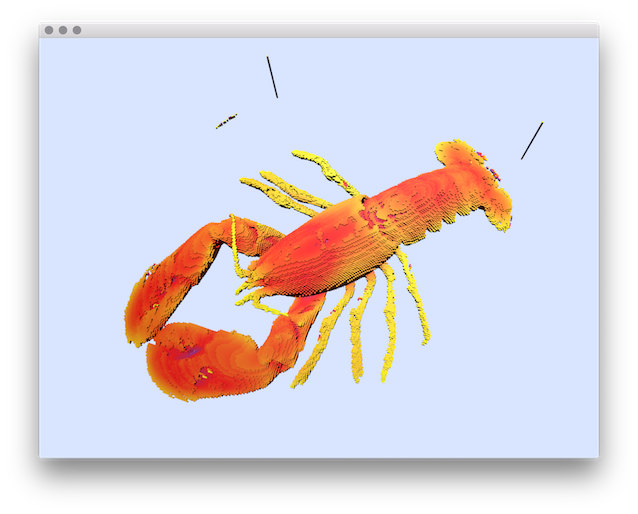Computes and visualizes mean or gaussian curvature of binary shapes.
Vol file viewer, with curvature (mean or Gaussian, see parameters) information on surface. Blue color means lowest curvature Yellow color means highest curvature Red means the in-between
Uses IntegralInvariantCurvatureEstimation
- See also
- related article: Coeurjolly, D.; Lachaud, J.O; Levallois, J., (2013). Integral based Curvature Estimators in Digital Geometry. DGCI 2013. Retrieved from https://liris.cnrs.fr/publis/?id=5866
Usage: 3dCurvatureViewer -i file.vol –radius 5 –mode mean
Allowed options are:
-h [ --help ] display this message
-i [ --input ] arg .vol file
-r [ --radius ] arg Kernel radius for IntegralInvariant
-t [ --threshold ] arg (=8) Min size of
SCell boundary of an
object-l [ --minImageThreshold ] arg (=0) set the minimal image threshold to
define the image object (object defined
by the voxel with intensity belonging
to ]minImageThreshold,
maxImageThreshold ] ).
-u [ --maxImageThreshold ] arg (=255) set the minimal image threshold to
define the image object (object defined
by the voxel with intensity belonging
to ]minImageThreshold,
maxImageThreshold] ).
-m [ --mode ] arg (=mean) type of output : mean, gaussian, k1,
k2, prindir1, prindir2 or normal
(default mean)
-o [ --exportOBJ ] arg Export the scene to specified OBJ/MTL
filename (extensions added).
-d [ --exportDAT ] arg Export resulting curvature (for mean,
gaussian, k1 or k2 mode) in a simple
data file each line representing a
surfel.
--exportOnly Used to only export the result without
the 3d Visualisation (usefull for
scripts).
-s [ --imageScale ] arg scaleX, scaleY, scaleZ: re sample the
source image according with a grid of
size 1.0/scale (usefull to compute
curvature on image defined on
anisotropic grid). Set by default to
1.0 for the three axis.
-n [ --normalization ] When exporting to OBJ, performs a
normalization so that the geometry fits
in [-1/2,1/2]^3
Below are the different available modes:
- "mean" for the mean curvature
- "gaussian" for the Gaussian curvature
- "k1" for the first principal curvature
- "k2" for the second principal curvature
- "prindir1" for the first principal curvature direction
- "prindir2" for the second principal curvature direction
- "normal" for the normal vector
Example:
Now we compare the different curvature values from the two shapes:
3dCurvatureViewer -i $DGtal/examples/samples/lobster.vol -r 10 -l 40 -u 255 -m mean
You should obtain such a visualisation:

resulting visualisation of mean curvature.
- See also
- 3dCurvatureViewer.cpp, 3DCurvatureViewerNoise

 1.8.10
1.8.10